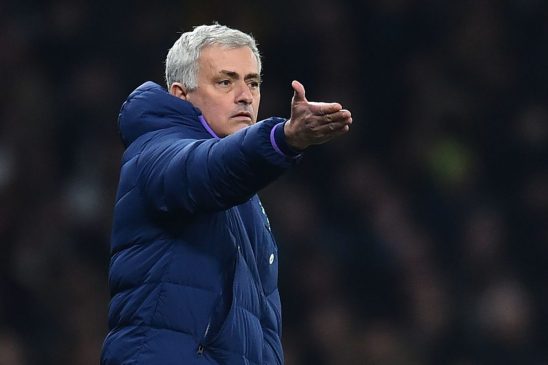- Tottenham moved to within a point of the top four after the weekend’s Premier League action.
- It is wrong to say that Mourinho has made no changes to this Spurs side.
- The Portuguese are experimenting with tactics he has rarely used before.
It could prove to be one of the most important goals of Tottenham’s season. Deep into second-half stoppage time on Sunday, Son Heung-min raced clear of the Aston Villa defense and slid the ball past Pepe Reina. Mourinho’s side pocketed the three points at the death.
Chelsea’s 2-0 loss to Manchester United on Monday means Spurs are now just one point adrift of the top four. If he qualifies the club for the Champions League, Mourinho will have done a fine job in north London this term.
The Portuguese’s overall philosophy still differs from the vast majority of coaches at the highest level of the modern game. But that does not mean he is incapable of adaptation. Here are three things Mourinho has done differently in the first few months of his Tottenham tenure.
1. Harry Winks has been a regular
Mourinho has tended to prefer tall, physical central midfielders during his career. He signed Nemanja Matic at both Chelsea and Manchester United, for instance.
Harry Winks was therefore expected to suffer following Mourinho’s arrival at the Tottenham Hotspur Stadium. The England international is slightly built and known for his technical prowess more than his power.
Mourinho has, of course, included creative players in the sides he has previously managed. However, he has usually deployed them in a more advanced role, rather than in the center of the park. Think Wesley Sneijder at Inter and Mesut Ozil at Real Madrid.
Winks is not that type of player. He plays in a deeper role and specializes in retaining possession rather than penetrating opposition defenses. Yet he has been a regular under Mourinho in recent weeks, setting the tempo of Tottenham’s play from the engine room.
2. No conventional centre-forward for Mourinho
This change has been forced upon Mourinho, yet it is still significant. Harry Kane would almost certainly have played every Premier League game under his new boss had he not hurt his hamstring against Southampton in December.
Yet that injury happened before the January transfer window opened. In the past Mourinho would have demanded a new centre-forward. He would have made it clear that the options in his squad were simply not good enough.
Mourinho did initially voice concern about Kane’s extended absence. But Spurs did not sign a short-term, like-for-like replacement in January, despite having the money to bring in Steven Bergwijn from PSV.
Against Villa, Mourinho used Son upfront with Bergwijn and Lucas Moura in support. That is a very different forward line to what we have grown accustomed to from Mourinho.
After all, the 57-year-old has usually opted for tall, strong center-forwards such as Didier Drogba, Karim Benzema, Zlatan Ibrahimovic and Romelu Lukaku.
3. Tottenham often build up with a back three
Arguably the biggest departure from Mourinho’s usual approach can be found by looking at his side’s defensive record. Tottenham beat Villa 3-2 on Sunday. They also beat Southampton 3-2 in the FA Cup two weeks ago. Spurs have kept just three clean sheets in 20 games under Mourinho.
That is surprising given the Portuguese’s reputation for solid defenses. But, so far at least, he has placed a greater emphasis on attack.
This can even be seen in the way he sets up his backline. Mourinho has often instructed his side to build up the play in a lopsided formation. Serge Aurier has pushed into attack from right-back. On the other side, the left-back – either Jan Vertonghen, Japhet Tanganga or Ben Davies – has been told to stay back.
That is something we have not really seen before from Mourinho. The three-time Premier League champion has innovated more than most onlookers expected in his first few months as Tottenham boss.
This article was edited by Samburaj Das.




